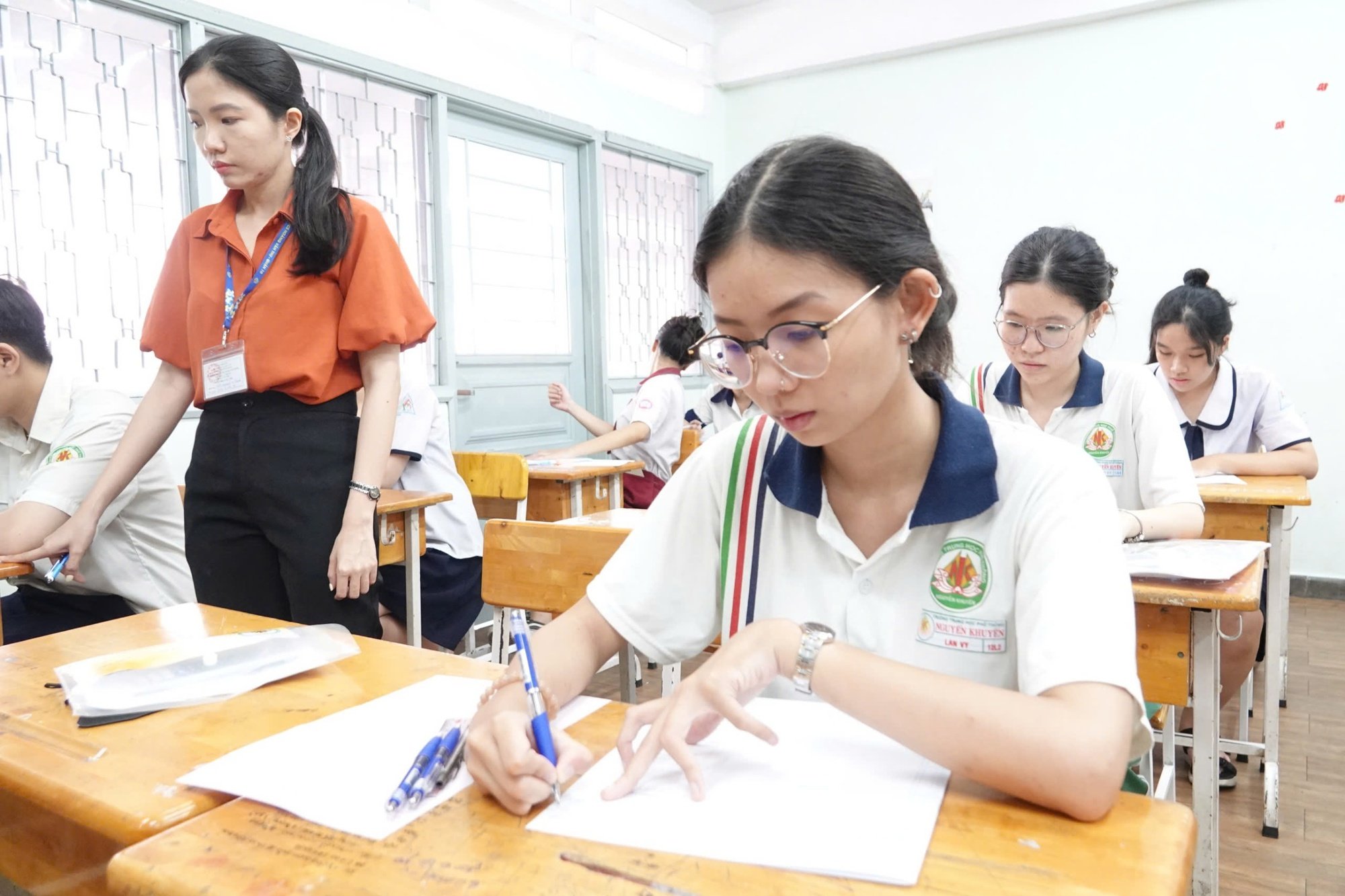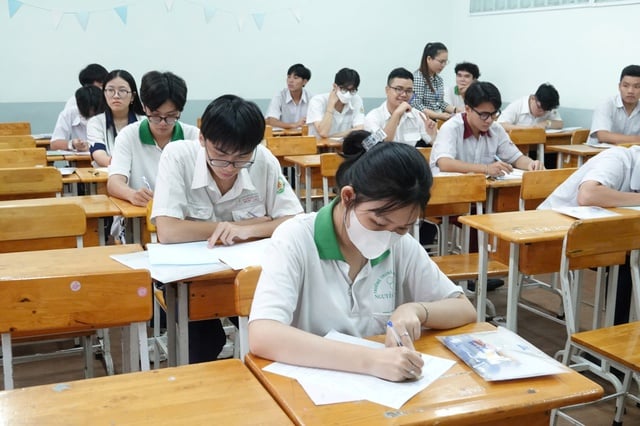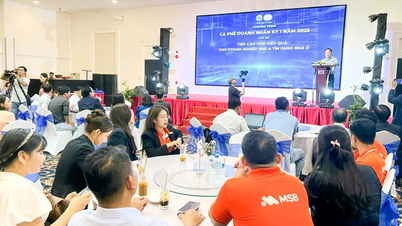In order to create a new breakthrough and continue to more strongly implement the fundamental and comprehensive innovationof education and training, decentralization of the organization of high school graduation exams is set forth as an urgent requirement.
Accordingly, the pilot project allowing some qualified localities to be autonomous in organizing and creating high school graduation exams is not only in line with modern management trends but also an important driving force to improve the quality of education and approach international standards.
POLICY AND PRACTICAL CONDITIONS ARE SUITABLE
On November 14, 2023, at the Government Headquarters, Deputy Prime Minister Tran Hong Ha chaired a meeting of the National Council for Education and Human Resources Development. At the meeting, the Deputy Prime Minister noted that educational innovation is a very large and complicated issue, with some goals set that will take 5-10 years to achieve. The Ministry of Education and Training has carefully studied all exam options, including piloting the permission for some localities to set their own questions and organize their own exams according to the Ministry's criteria. This is a step forward in decentralizing educational management, and at the same time reflects the practical needs of some localities that want to make breakthroughs and catch up with advanced countries in the region.

Candidates taking the high school graduation exam in Ho Chi Minh City. This city has repeatedly requested to organize its own high school graduation exam.
PHOTO: DAO NGOC THACH
Ho Chi Minh City was once one of the pioneering localities to propose autonomy in high school graduation exams. This demonstrates the desire for innovation, in line with the characteristics of socio-economic development and the need to improve the quality of education of the city, catching up with advanced countries. In the context of provincial mergers, Ho Chi Minh City in the future will also have Binh Duong and Ba Ria-Vung Tau, so human resources, facilities and technology will be more abundant, favorable for implementing the pilot model of autonomy in exam setting.
In particular, the policy of piloting the socialist model in some localities with outstanding potential has created a political and legal basis for implementing strong reforms, including education and training. This innovation will train new people to develop comprehensively, meeting the skills requirements of the 21st century, such as critical thinking, creativity, problem solving, self-study and lifelong self-study, aiming at global citizens.
REASONS FOR LOCAL DECENTRALIZATION
First of all, innovation in examinations and assessments is the lever of high-quality education. In particular, autonomy in setting questions helps localities design practical examinations, accurately assessing students' abilities, not only assessing according to the requirements for qualities and abilities specified in the 2018 General Education Program, but also aiming at international standards such as OECD's PISA assessment, SAT (USA), A-Level (UK) or Gaokao (China).
Next, it is impossible to evaluate with a common measure, while the quality of education between localities still has a large difference. Applying the same exam nationwide while socio-economic conditions, student levels and organizational capacity are different is unreasonable, and does not encourage localities with conditions to get ahead. It is necessary to create a mechanism for strongly developed localities to go first, to serve as a model for many other provinces and cities. Only then can Vietnamese education deeply integrate with the international community.
Third, adapt to digital transformation and computer-based testing. This is the computer-based testing policy of the Ministry of Education and Training in the coming years, requiring a flexible question bank and test structure - this is only feasible when the localities assigned to pilot the task have enough human resources and equipment to create their own test questions and organize computer-based testing.
Fourth, approaching international assessment standards. Autonomy in setting questions paves the way for integrating new competencies such as critical thinking, creativity, interdisciplinary skills, problem solving, learning from artificial intelligence, etc., helping Vietnamese students better integrate with the world.
Finally, the team of teachers is ready. In recent years, the Ministry of Education and Training has organized training for key high school teachers nationwide on exam development techniques in the direction of competency assessment. Teachers in localities who have been trained in exam development are familiar with the high school graduation exam format, have participated in building the exam bank, and are therefore capable of undertaking the graduation exam development stage if assigned the task.
OPPORTUNITIES AND CHALLENGES FOR LOCALITIES
Allowing certain localities to create their own exam questions, if implemented properly, will open up opportunities for educational innovation but also pose many challenges.
Accordingly, localities will have opportunities when increasing autonomy. Localities that are granted autonomy in examinations will be more proactive in educational management, in accordance with regional characteristics. Teachers and managers will improve their capacity through participating in developing questions, thereby innovating teaching and assessment methods. Exams can be more creative, integrating local knowledge, helping students connect theory with practice and meeting the requirements of human resource training for localities and global integration.
However, local authorities setting their own questions can easily lead to differences in difficulty between localities, affecting fairness in graduation recognition and university and college admissions. Universities will face difficulties when having to evaluate many sets of inconsistent questions. Negative risks such as cheating and leaking questions can occur if the organization process is not strict, especially in places lacking human resources and facilities, and it may be unfair to some students when they have to take questions with higher difficulty than the national exam.

Innovation in examinations and assessment is the lever of high-quality education
Photo: Dao Ngoc Thach
SOLUTIONS FOR EFFECTIVE IMPLEMENTATION
First of all, the Education Law stipulates that students who complete the high school program and meet the requirements set by the Minister of Education and Training are eligible to take the exam and are awarded a high school diploma (there is no regulation on national or local exams). Therefore, the Ministry of Education and Training needs to issue output standards as a basis for designing local exams according to a common national competency framework.
Second, the pilot is selective, prioritizing localities with good exam organization foundation, human resources and infrastructure.
Independent monitoring and strict post-auditing, establishing a continuous monitoring mechanism, and transparently verifying exam results.
Compare results, adjust policies, and compare exam results between localities to make adjustments and ensure fairness in graduation recognition and enrollment.
The Ministry of Education and Training plays a coordinating role, sharing sample question banks, training human resources and providing technology platforms.
Autonomy in setting exam questions is not a loosening of management, but a controlled and supervised decentralization to promote creativity and raise educational standards. If done properly, decentralization of exam organization can become a model of reform - not only in education but also for modern public administration thinking. This is not just a technical issue, but a strong signal for real reform.
Experience from developed countries
In the world, some countries have decentralized the organization of exams, exam questions, and recognition of high school graduation for each province/state.
In Canada, each province/state such as Alberta or British Columbia sets its own exams, ensuring relevance and flexibility, with independent testing.
In Germany, states organize their own graduation exams but still ensure common standards, serving national university admissions.
In the US, states administer their own tests, but they all aim for a common set of core skills. States can benchmark their assessments against each other or against assessments from other countries with good educational standards.
These models show that decentralization does not reduce quality, but rather increases flexibility and local relevance, as long as there is a common framework and independent testing.
Source: https://thanhnien.vn/dia-phuong-ra-de-thi-duoc-khong-neu-giao-hieu-truong-cap-bang-tot-nghiep-thpt-185250513215954165.htm




![[Photo] Anh Hoang - Dinh Duc successfully defended the men's doubles championship of the National Table Tennis Championship of Nhan Dan Newspaper](https://vphoto.vietnam.vn/thumb/1200x675/vietnam/resource/IMAGE/2025/5/23/d6ab3bcac02c49928b38c729d795cac6)
![[Photo] Top players gather at the 2025 Nhan Dan Newspaper National Table Tennis Championship](https://vphoto.vietnam.vn/thumb/1200x675/vietnam/resource/IMAGE/2025/5/23/9ad5f6f4faf146b08335e5c446edb107)





















































































Comment (0)